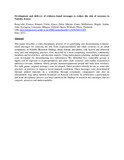| dc.contributor.author | Kang’ethe, Erastus | |
| dc.contributor.author | Kimani, Violet | |
| dc.contributor.author | Grace, Delia | |
| dc.contributor.author | Mitoko, Grace | |
| dc.contributor.author | McDermott, Brigid | |
| dc.contributor.author | Ambia, Julie | |
| dc.contributor.author | Nyongesa, Concepta | |
| dc.contributor.author | Mbugua, Gabriel | |
| dc.contributor.author | Ogara, William | |
| dc.contributor.author | Obutu, Peninnah | |
| dc.date.accessioned | 2013-03-18T06:37:38Z | |
| dc.date.issued | 2012 | |
| dc.identifier.citation | Trop Anim Health Prod (2012) 44 (Suppl 1):S41–S46 | en |
| dc.identifier.uri | http://erepository.uonbi.ac.ke:8080/xmlui/handle/123456789/14301 | |
| dc.description.abstract | This paper describes a trans-disciplinary process of co-generating and disseminating evidence-based messages for reducing the risk from cryptosporidiosis and other
zoonoses in an urban community in Nairobi. Research findings about disease prevalence, risk factors and observed risky and risk-mitigating practices were analysed by a team
comprising researchers, community members and local policy- and decision-makers. Using participatory planning, multiple strategies were developed for disseminating key information. We identified five vulnerable groups at higher risk of exposure to cryptosporidiosis and other cattle zoonoses with similar transmission pathways (women, children, elderly people, immunosuppressed people and male farm workers). For each group, targeted messages were developed. Good practices already in use, as were also practices as practices to improve environmental conditions. These messages were disseminated through printed material, in a workshop, through community campaigners and also an edutainment soap opera episode broadcast on Kenyan television.
In conclusion, a participatory and trans-disciplinary process can help transform the findings of research into messages that are targeted, attractive and understandable. | en |
| dc.language.iso | en | en |
| dc.publisher | Springer | en |
| dc.subject | Participatory | en |
| dc.subject | Risk mitigation | en |
| dc.subject | Zoonoses | en |
| dc.subject | Ecohealth | en |
| dc.title | Development and delivery of evidence-based messages to reduce the risk of zoonoses in Nairobi, Kenya | en |
| dc.type | Article | en |
| local.publisher | Department of Public Health, Faculty of Veterinary Medicine, University of Nairobi, | en |
| local.publisher | Department of Community Health, University of Nairobi, | en |
| local.publisher | International Livestock Research Institute, | en |
| local.publisher | Biometry Unit, Department of Crop Science, University of Nairobi, | en |
| local.publisher | Centre for Microbiological Research, Kenya Medical Research Institute, | en |

